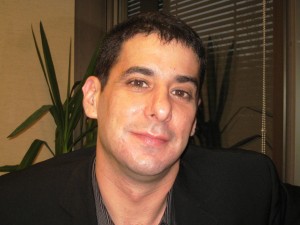Justin’s Japan: Interview with “Tokyo Vice” Author Jake Adelstein on Yakuza Films, Umbrellas

"I think the JET Program is a wonderful thing. Many people who have become scholars of Japan and have settled down in Japan begin on the JET Program. It is a wonderful way for the Japanese to get to understand Americans, and Americans to get to understand Japan." (Justin Tedaldi)
By JQ magazine editor Justin Tedaldi (CIR Kobe-shi, 2001-02) for Examiner.com. Visit his page here for related stories.
Examiner’s note: The following interview was conducted at New York’s Japan Society on March 10, 2011, hours before the Tohoku earthquake and tsunami would ravage eastern Japan. I was there to chat with guest lecturer Jake Adelstein, whose twelve-year career as a crime reporter for the Yomiuri Shinbun was chronicled in his acclaimed 2009 book Tokyo Vice. Adelstein is currently working on his second book, and as the editor of the Japan Subculture Research Center blog he continues to report on all the intriguing and seedy aspects that keep Japan running. In this exclusive interview, I spoke with Adelstein during an ominous cloudburst.
Thanks for meeting in this gloomy weather.
I used to like rainy weather, but my bodyguard, who’s an ex-yakuza, hates rainy weather. And I asked him once—I wish I hadn’t asked him—“What’s your deal with rainy weather? Why do you always not want to go out of the house and discourage me from going out?” And he’s like, “Oh, you know, when a yakuza kills another yakuza, they almost always do it on a rainy day, because first of all: bad visibility. The sound of the rain blurs the sounds of what’s going on, and the rain washes away all the trace evidence.” And ever since then, I haven’t been able to enjoy rainy weather as much as I used to.
I read that your birthday is coming up.
Well, let’s see. I’ll be 42. If all goes well, I will be ordained as a Soto Zen Buddhist priest on my birthday. I’ve got about a week of training left—if I could just remember that damn sutra. I had a talk with the priest and told him that I didn’t believe in the metaphysics of Buddhism, and he was like, “It’s all right. You just have to pretend that they’re true.” So as long as you uphold the precepts, it’s not belief; it’s deeds. I’m comfortable with that, the Episcopal King James version of Buddhism.
In an interview last year, you said you were going to have the opportunity to meet with yakuza boss Goto Tadamasa…
I might still have the opportunity, if he’s in good health. He’s been in and out of the hospital.
That’s his current status?
Yeah. He is still a priest. I’ve had some issues with his autobiography that was published last year, which had the equivalent of a yakuza fatwa on me. If you understand how the yakuza order people to be killed, you can read the lines very well. He refers to the attack on the director Itami Juzo in his memoirs and says, “Of course he deserved to be attacked, because he wrote a movie that was unpleasant about the yakuza,” and he refers to my writing as unpleasant. And then he has these two lines about, “I don’t know who this guy is, but even as an ex-yakuza, if I ever met him he would go from someone being targeted for death to someone being dead, ha-ha-ha.”
When a boss wants someone whacked in the yakuza, what he does is, he never gives an order, because then he could be held responsible. He just says, you know, “Johnson-san is a real pain in the ass; I don’t really like Johnson-san very well.” And his cohort immediately knows that he’s been asked to whack the guy. He whacks him and goes to jail, and comes out and gets a cash bonus from the organization. That’s how it’s done.
There’s talk that a film version of Tokyo Vice is in the works.
John Lesher, who produced No Country for Old Men, is signed on as the producer. There have been two or three actors who have expressed interest in playing the role. J.T. Rogers, who is a very good playwright—he’s got a play opening at Lincoln Center this year called Blood and Gifts—he is the principal screenwriter, and I am the co-writer. J.T. and I went to the same high school together. Actually, it’s interesting: he’s a very successful playwright, writes about Afghanistan and foreign countries. Peter Hessler, who is a China expert, he and I also hung out in high school at the same time.
What are your thoughts on the JET Program?
I think the JET Program is a wonderful thing. Many people who have become scholars of Japan and have settled down in Japan begin on the JET Program. It is a wonderful way for the Japanese to get to understand Americans, and Americans to get to understand Japan. Like any program, it has problems. I think it’s a great thing, and I hope it continues to be supported by both sides.


Comments are closed.